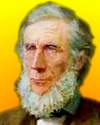 (source)
(source)
|
John Tyndall
(2 Aug 1820 - 4 Dec 1893)
Irish physicist who demonstrated why the sky is blue. He wrote on diverse topics, including crystals, glaciers and radiation. His studies also included spontaneous generation, the germ theory of disease and ozone.
|
John Tyndall Quotes on Observation (4 quotes)
>> Click for 48 Science Quotes by John Tyndall
>> Click for John Tyndall Quotes on | Experiment | Fact | Faraday_Michael | Life | Michael Faraday | Nature | Number | Phenomenon | Power | Science | Truth | Wave |
>> Click for 48 Science Quotes by John Tyndall
>> Click for John Tyndall Quotes on | Experiment | Fact | Faraday_Michael | Life | Michael Faraday | Nature | Number | Phenomenon | Power | Science | Truth | Wave |
[Louis Rendu, Bishop of Annecy] collects observations, makes experiments, and tries to obtain numerical results; always taking care, however, so to state his premises and qualify his conclusions that nobody shall be led to ascribe to his numbers a greater accuracy than they merit. It is impossible to read his work, and not feel that he was a man of essentially truthful mind and that science missed an ornament when he was appropriated by the Church.
— John Tyndall
In The Glaciers of the Alps (1860), 299.
By teaching us how to cultivate each ferment in its purity—in other words, by teaching us how to rear the individual organism apart from all others,—Pasteur has enabled us to avoid all these errors. And where this isolation of a particular organism has been duly effected it grows and multiplies indefinitely, but no change of it into another organism is ever observed. In Pasteur’s researches the Bacterium remained a Bacterium, the Vibrio a Vibrio, the Penicillium a Penicillium, and the Torula a Torula. Sow any of these in a state of purity in an appropriate liquid; you get it, and it alone, in the subsequent crop. In like manner, sow smallpox in the human body, your crop is smallpox. Sow there scarlatina, and your crop is scarlatina. Sow typhoid virus, your crop is typhoid—cholera, your crop is cholera. The disease bears as constant a relation to its contagium as the microscopic organisms just enumerated do to their germs, or indeed as a thistle does to its seed.
— John Tyndall
In 'Fermentation, and its Bearings on Surgery and Medicine', Essays on the FloatingMatter of the Air in Relation to Putrefaction and Infection (1881), 264.
Every occurrence in Nature is preceded by other occurrences which are its causes, and succeeded by others which are its effects. The human mind is not satisfied with observing and studying any natural occurrence alone, but takes pleasure in connecting every natural fact with what has gone before it, and with what is to come after it.
— John Tyndall
In Forms of Water in Clouds and Rivers, Ice and Glaciers (1872), 1.
With accurate experiment and observation to work upon, imagination becomes the architect of physical theory.
— John Tyndall
In discourse delivered before the British Association at Liverpool (16 Sep 1870), 'Scientific Use of the Imagination', collected in Fragments of Science: a Series of Detached Essays, Addresses and Reviews (1892), Vol. 2, 104.
See also:
- 2 Aug - short biography, births, deaths and events on date of Tyndall's birth.
- John Tyndall - context of quote “Fatal…to blink facts” - Medium image (500 x 250 px)
- John Tyndall - context of quote “Fatal…to blink facts” - Large image (800 x 400 px)
- John Tyndall - context of quote “The First Experiment a Child Makes” - Medium image (500 x 250 px)
- John Tyndall - context of quote “The First Experiment a Child Makes” - Large image (800 x 400 px)
- On Matter and Force - John Tyndall’s Lecture to general public at Dublin (1867).
- A Vision of Modern Science: John Tyndall and the Role of the Scientist in Victorian Culture, by Ursula DeYoung. - book suggestion.
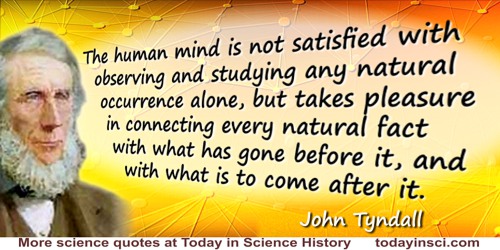

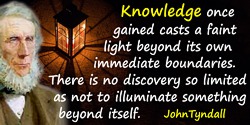
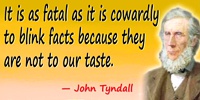
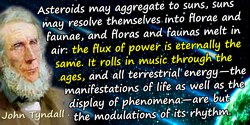
 In science it often happens that scientists say, 'You know that's a really good argument; my position is mistaken,' and then they would actually change their minds and you never hear that old view from them again. They really do it. It doesn't happen as often as it should, because scientists are human and change is sometimes painful. But it happens every day. I cannot recall the last time something like that happened in politics or religion.
(1987) --
In science it often happens that scientists say, 'You know that's a really good argument; my position is mistaken,' and then they would actually change their minds and you never hear that old view from them again. They really do it. It doesn't happen as often as it should, because scientists are human and change is sometimes painful. But it happens every day. I cannot recall the last time something like that happened in politics or religion.
(1987) -- 


